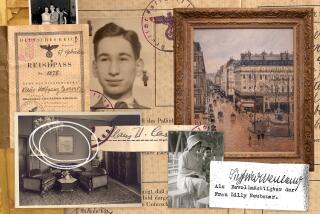Florida man seeks posters’ restitution
- Share via
BERLIN — Peter Sachs was only a year old in 1938 when the Nazis seized his father’s collection of rare posters and the Jewish family fled to the United States.
He returned to Germany on Tuesday for the first time in nearly seven decades to try to recover the thousands of first-run prints that could be worth as much as $50 million.
Walking through the German Historical Museum, which holds what is left of the collection, he gazed contemplatively at the colorful works, his first glimpse of the placards that had been so precious to his father, Hans.
“It’s a little bit difficult to describe. I’m still trying to take it all in,” the retired US Airways pilot said as he looked at a poster advertising a trade convention in Dresden from 1911. “I wish I had all day to spend here.”
Sachs, 69, of Sarasota, Fla., will testify Thursday at a government commission that will determine whether the collection should be returned to him or stay at the museum, which inherited it from East Germany after the fall of the Berlin Wall.
He contends that although his father received some compensation, it came from West Germany when it was believed the collection had been destroyed during the war. Now that it turns out that 4,300 posters survive, he said, they should be returned to his family.
Sachs’ attorney, Gary Osen, said a good estimate of the collection’s value would be between $10 million and $50 million.
It includes elaborate advertisements for exhibitions, cabarets and consumer products as well as political propaganda. One on display at the museum is an early anti-Semitic placard from 1920, showing the Nazi Party’s ideal “Aryan” woman next to the caricature of a Jew above a coffin atop a slab labeled “Deutschland.”
Although he said he has no concrete plans for what he would do with the posters, Sachs said he wants to somehow make as many as possible available for the public to see. The Berlin museum has only 14 on display; the rest are in storage.
The museum says the posters play an integral part of its 80,000-piece collection, filling in many gaps from turn-of-the-century Germany. Collections director Dieter Vorsteher noted that although only a few were on display, those in storage were regularly used by researchers.
The museum will be represented at the hearing Thursday by its attorneys. Vorsteher would not comment on details of the case.
“I can well understand one’s desire to have back what was owned by their father, but we are trying to fight for the interests of the museum,” Vorsteher said.
“It is not my collection but the Federal Republic of Germany’s collection, and the country will decide whether we have to give it back or not, [but] it would not only be a loss for us but for the history of posters,” he said.
Born in 1881, Hans Sachs was a dentist who began collecting posters while in high school. By 1905, he was Germany’s leading private poster collector, and he later launched the art publication Das Plakat, or The Poster.
After the Nazis came to power, the collection caught the eye of Propaganda Minister Joseph Goebbels, who wanted it for a museum, and it was seized in summer 1938.
After the war, Hans Sachs assumed the collection had been destroyed and accepted compensation of about $50,000 from West Germany in 1961. He learned five years later that part of the collection was in an East Berlin museum.
After communism fell, the collection was given to the German Historical Museum in 1990.
More to Read
Sign up for Essential California
The most important California stories and recommendations in your inbox every morning.
You may occasionally receive promotional content from the Los Angeles Times.













